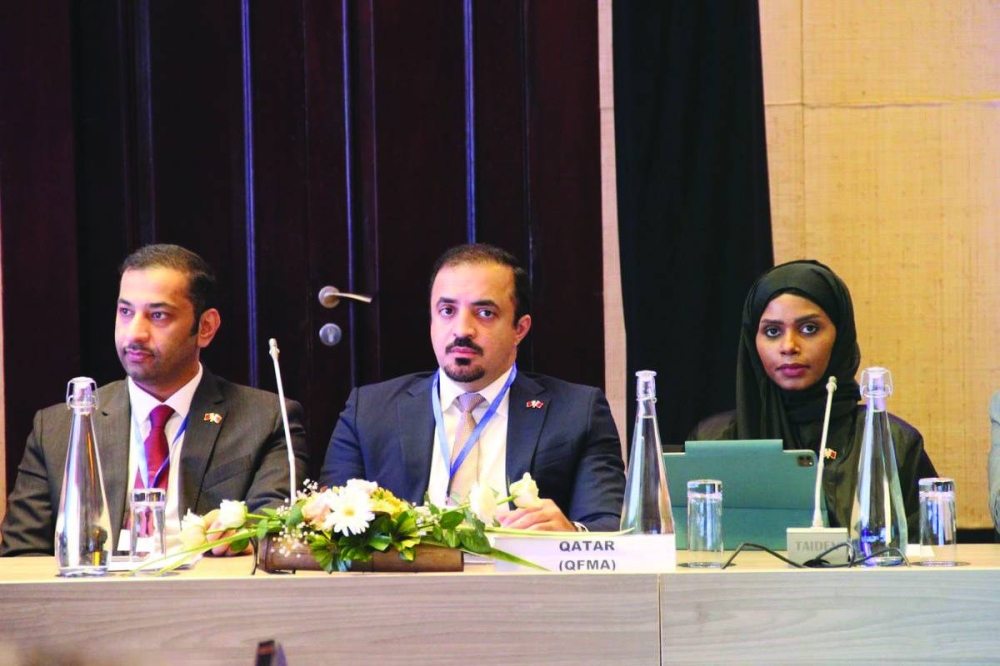Chief Executive Officer of the Qatar Financial Markets Authority (QFMA), Dr Tamy bin Ahmed Ali al-Binali, participated with an official delegation in the annual meeting of the International Organisation of Securities Commissions (IOSCO's) Africa and Middle-East Regional Committee (AMERC), which was held in the Republic of Mauritius.
Many key issues and topics related to financial markets were discussed in the meeting, particularly financial technology (fintech) and how non-banking financial institutions rely on technology to broaden their operations, and how market stability can be ensured, and investors may be protected. Other issues discussed include sustainable financing and the supervisory practices of IOSCO, market developments and regulatory initiatives in the region, and carbon markets.
Reem Khalid al-Mahmoud, Acting Head of the Risk Unit at the QFMA, and a member of the Authority's delegation to the meeting of the IOSCO's Africa and Middle-East Regional Committee (AMERC), presented a working paper on "Qatar's Experience in Developing Financial Markets," where she stated that the capital market in Qatar has achieved remarkable growth over the past 17 years.
She noted that, initially, there was only one market with 17 listed companies, but later in 2005, a new legislation was issued, leading to the establishment of the Qatar Financial Markets Authority as a regulatory entity in 2007. Since then, according to al-Mahmoud, the first and second financial sector strategies were introduced, and within a span of 7 years, the capital market achieved the emerging market status.
She also said that during this period, a new securities legislation was implemented in Qatar covering bonds, treasury bills and exchange-traded funds, and new activities were introduced such as liquidity providers, market makers and margin trading. This led to an increase in the number of licensed companies to 50 by 2022.
Al-Mahmoud pointed out the fact that, in 2023, the third strategy was launched with a view to making the Qatari capital market eligible for the advanced market status through initiatives designed to focus on market development and innovative regulations.
Al-Mahmoud explained that the upgrades in the financial market in Qatar reflect a dynamic landscape geared by the growth of the capital market, regulatory changes, digital transformation, and a strategic vision that emphasises innovation, inclusivity, and sustainability. She stressed that Qatar, as a member of IOSCO, aims to partake in the initiatives that maintain high market standards and ensure investor protection and regulatory efficiency.
She also said that the QFMA is an embodiment of regulatory excellence as it promotes positive change and innovation in the Qatari financial markets to seize opportunities for digital transformation and financial innovation, in addition to encouraging the adoption of fintech and employing smart solutions to support the market's ability to deal with unfolding challenges. In effect, this will result in enhancing the attractiveness and competitiveness of the Qatari financial sector in the international arena.
Since it became a member of the IOSCO in 2013, the QFMA is considered an active and effective member in it. The QFMA has also joined several main committees affiliated with the organization, such as the Presidential Committee, the Growth and Emerging Markets Committee, the Africa and Middle-East Regional Committee, and the Multilateral Memorandum of Understanding Monitoring Group.
The IOSCO sets the standards for oversight and monitoring that are recognised by the international financial community, and to which all member states must adhere.

QFMA Chief Executive Officer Dr Tamy bin Ahmed Ali al-Binali participated with an official delegation in the annual meeting of IOSCO's Africa and Middle-East Regional Committee (AMERC), which was held in the Republic of Mauritius.
